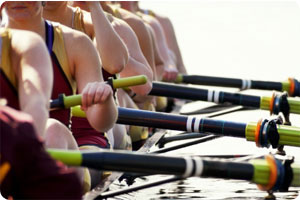Carbs are king for high intensity rowing. The harder you row – the more you burn.
First – a few simple truths:
- Your muscles consume mainly carbohydrates (stored as glycogen) during a hard 2k erg or rowing race.
- During an all-out maximum 55 strokes per minute sprint – almost all of your energy comes from carbohydrates.
- On the other hand – at 50% of VO2max (which is around 69% Max Heart Rate intensity rowing) around 33% of your energy comes from carbohydrate.
In the beginning…
A high carbo loading diet was (and still is in different guises) a very popular method of improving athletic performance in the 1970s. Especially among marathon runners and cross country skiers.
But times have changed and most athletes & rowers are well aware of a good diet and its importance to high performance sport. Most good rowers (including lightweights) consume an excellent diet that has a high proportion of carbohydrates during training and in preparation for 2k racing.
But some still don’t…
Why a High Carbo Diet is Important for Rowing Training and Racing.
Rowing training fatigue is cumulative. Let’s take an example:
Say you erg on Monday and pull 3 x 1000 meters all out with 3 minutes easy rowing between work intervals. You go home and decide that you are too tired to eat and decide instead to watch the rowing scenes in ‘The Social Network’ over and over – just for err… kicks?
Then on Tuesday you do an early morning, on-water rowing session – 90 minutes at low rating and low intensity. But this time you do eat – before the session you have a coffee and a slice of toast. After the session, because you are in a hurry to get to work you leave the boat house immediately and end up eating nothing until lunch time. At which point you have a great big chicken caesar salad.
That evening (right after work) you have another erg session. This time it’s 5 x 5 minutes at Threshold pace. With a 5 minute break between work phases.
How do you think you would perform in that erg session?
Do you think that you would be pulling close to your best? (assuming the training load of the past 2 days is a normal load for you)
The answer is you would probably suffer hard because you have no fuel to fire your muscles because you’ve eaten very little carbohydrates in the previous 24 hours.
In other words you’re glycogen depleted. And doing hard erg or rowing sessions (or 2k races) when you are glycogen depleted is NOT a good place to be.
Even over a week, you can slowly get depleted if you don’t keep topping up the fuel you’ve burned. This is even more problematic when it’s racing season and you are doing a lot of high intensity rowing sessions.
So the bottom line is when it comes to training – keep topping up. And remember – it’s cumulative (even over 24 hours).
2 Steps to Boosting Recovery Time.
After a hard interval rowing session or a long steady endurance session, eating carbohydrates within a short time can improve your recovery time. Aim to eat a carbo rich food with a high Glycemic Index(GI) within 2 hours of the session. During this time, your glycogen reloading ability is sky high so it’s a great head start in boosting your recovery time.
And the sooner the better.
If you can have something within 20 minutes of the rowing session it’s even better. And when it comes to competitive team or group situations, this can mean the difference between doing well at the following day’s 2k erg – and doing only average.
Here are some high Glycemic Index(GI) Food and Drinks:
- Sports Drinks
- Bagels
- Raisins
- Bananas (well ripened)
- Dates
- White Bread
- Corn Flakes
- Waffles
- Doughnuts
- Biscuits
- Jelly Beans
The first few on that list are obviously healthier options than the last few. But you get the idea. Try to be organised and bring a little snack with you to eat immediately after training.
The next thing you need to do in your 2-step recovery eating plan is to eat a meal high in mid – GI Carbohydrates within 2 hours of training. Here are some examples of mid GI foods.
- Wholemeal Pasta
- Porridge
- Muffins
- Whole Meal Bread
- Muesli
- Whole meal Brown Rice
- Durum Wheat Spaghetti
- Potato
You should also include some protein and fats in your meal. And remember to rehydrate. Carbohydrate needs water to help store itself in your muscles and liver
A Final Word for Lightweight Rowers
Ideally you should be just above race weight 4 – 5 days before your big 2k. You wouldn’t want to be more than 2kg above for a lightweight man and slightly less than that if you are a lightweight woman.
But with practice and learning your body’s response to eating carbs and retaining water (1 gram of carbohydrate needs around 3 grams of water for storage) you can also take advantage of high carbohydrate recovery eating.
I’ve had considerable results with some experimentation with lightweight rowers I’ve worked with. Many initially came from an old school that said carbs are bad for weight control. We learned to disprove that notion and more importantly we learned to improve the rowers’ performance, health and well-being (feeling of happiness) using a high carbo diet with heavy training and steady weight control near big 2k races.
[mc4wp_form]


